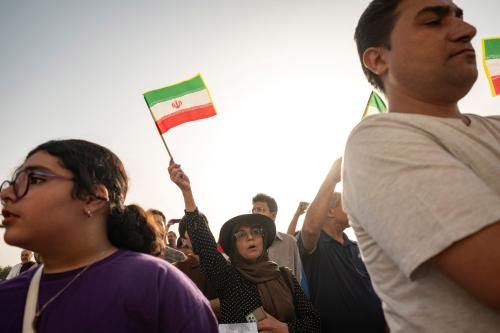For more than three years a conflict has raged between Israelis and Palestinians, claiming over 900 Israeli lives and over 3,000 Palestinian lives and causing great human suffering on both sides. For most of that time, the United States has stood idly by, unwilling to invest the resources, diplomatic energy and Presidential prestige necessary to helping the parties end this bloody and unnecessary conflict. I say “unnecessary” because the broad outlines of a settlement of the Israeli-Palestinian conflict are known and are acceptable to substantial majorities on both sides. President Clinton first defined those parameters in December 2000 after lengthy and detailed negotiations with Israeli and Palestinian officials. The failure of the Palestinian leadership under Yasser Arafat to accept those parameters at that time is now broadly recognized on the Palestinian side, and in the Arab world, as a tragic mistake.
Arafat himself is now trying to recoup what he lost back then through the vehicle of the Geneva Accords, negotiated by his close adviser Yasser Abed Rabbo with former Israeli Minister of Justice, Yossi Beilin. Even Hamas, the Islamic terrorist organization which preaches the destruction of Israel has recently acknowledged the pressure of Palestinian public opinion by declaring that it too would now be prepared to accept a Palestinian state in the West Bank and Gaza, albeit as an interim solution.
On the Israeli side, the Likud-led right wing government of Ariel Sharon has already formally accepted the two-state solution outlined in the U.S.-adopted, and UNSC-endorsed, Roadmap. Its Deputy Prime Minister, Ehud Olmert, has also declared that if Israel is to retain its nature as a democratic and Jewish state it will need to withdraw from most of the West Bank. And now the Prime Minister himself has expressed a willingness to withdraw almost all settlements in Gaza and some outlying settlements in the West Bank, which could serve as the necessary catalyst to the jump-starting of a new negotiating process.
All these developments are a product of three critical factors that now dominate the calculations of Israelis and Palestinians: exhaustion, demography, and the balance of power.
The Brookings Institution is committed to quality, independence, and impact.
We are supported by a diverse array of funders. In line with our values and policies, each Brookings publication represents the sole views of its author(s).



Commentary
TestimonyGetting the Arab-Israeli Peace Process Back on Track
February 24, 2004